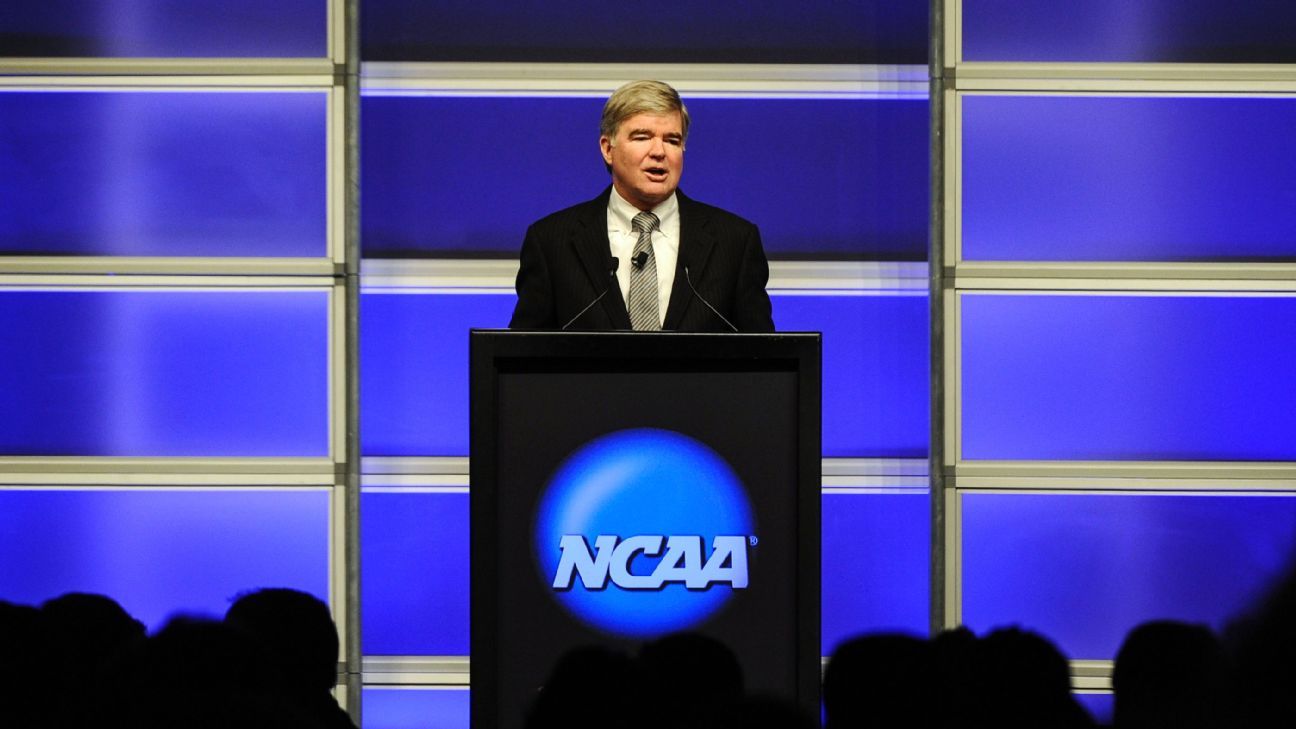
NEW ORLEANS — NCAA president Mark Emmert said Thursday at the Final Four that the association needs to work with Congress to create a uniform name-image-likeness model across all 50 states in order to properly regulate it moving forward.
Beginning last July 1, college athletes have had the opportunity to benefit from their name, image and likeness. The NCAA has its own name, image and likeness policy, but it defers to individual state laws on the exact regulations surrounding it.
The different state-by-state laws, Emmert said, have made it difficult to adopt a consistent NIL model across all colleges and universities.
“It is unfortunately a circumstance where we’ve got now 30-plus different states with different laws,” he said. “We need to work with Congress to create one federal landscape. We’ve had a variety of legal actions in the courts with all of that.
“That supersedes the board’s ability … We have got to have Congress find a single legal model by which NIL and other relationships with student-athletes can be regulated. That’s going to be a big task.”
Emmert spoke at length Thursday about the landscape-shifting changes in college sports over the past few years, including NIL, the transfer portal and the Supreme Court’s decision in the NCAA v. Alston case, which unanimously found the NCAA was violating antitrust law by placing limits on the education-related benefits that schools can provide to their student-athletes.
“We’re at a place of huge disjuncture around college sports,” Emmert said. “We’ve got a relatively, in my opinion, short window of time during which the schools, especially in Division I, need to decide what they want the relationship [with] student-athletes and their schools to be, what the governance structure around that can be in the current legal environment, and how the rules and structures at a national level, a divisional level, at a conference level could and should be made.”
“We need to be ready, willing and able to shift and shift in dramatic ways,” he added. “Collectively, we’ve gotta sit down and map out what we want to do.”
Before Emmert arrived at the podium, Duke coach Mike Krzyzewski took questions from the media — including one about what he would like to ask Emmert.
“I think the very first one is where are we going? And who is going to be in charge? Not that I’m saying that he shouldn’t be,” Krzyzewski said. “But what are we doing? What are we doing to make sure we’re taking care of all divisions that are under your roof — men, women, all sports, those that make money and those that just make men and women out of people.
“So there’s balance. And we’re understanding that everyone cannot be treated the same. That doesn’t mean that everyone’s not treated fairly. And it’s a new day that should have been a new day decades ago. So we’ve got a lot to make up for.”
Responding a few minutes later, Emmert said the group in charge hasn’t changed.
“Who is in charge is the same group that’s always been in charge. And that’s the schools,” he said. “There’s an enormous amount of misunderstanding about what the NCAA is. People speak of the NCAA as if it’s some monolithic entity. It’s not. It’s 1,100 schools that come together and make decisions in a collaborative, representative democracy. Those schools always have been in charge and those schools will be in charge moving forward.”
Emmert also addressed the NCAA’s enforcement process surrounding the FBI-related cases, specifically in response to a question about Kansas being in the Final Four despite receiving a notice of allegations in 2019. He said the process has “taken way too long” and should be “fair, swift and not punish the innocent” — those who were not involved in the activities.
“We have to get it in a place that’s right and I don’t think there’s anybody who thinks it is,” Emmert said.
Emmert declined to weigh on on Kansas’ decision to reward coach Bill Self with a new, lifetime contract on April 2, 2021 while the lengthy IARP process has been going on.
“I’ll leave it to the school to make decisions about their coaches’ contracts,” said Emmert. “That’s their business, obviously. They can do that as they see fit.”
With a number of states considering or passing legislation restricting participation of transgender athletes, Emmert also was asked whether the NCAA would bar those states from hosting championship events.
The NCAA has largely followed the Olympic model that allows transgender athletes to compete if they’ve had certain biomedical treatments, including hormone therapies, meant to promote fairness.
Emmert said the NCAA currently requires communities that wish to host events “to explain how it is that they’re going to make sure that the participants in that sport will be allowed to do that in a nondiscriminatory way. … If they can do that, then we’ll be in those states.”
The Associated Press contributed to this report.
